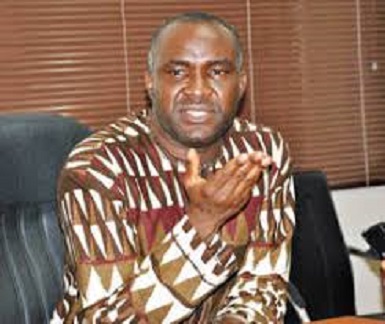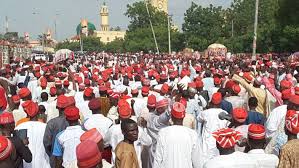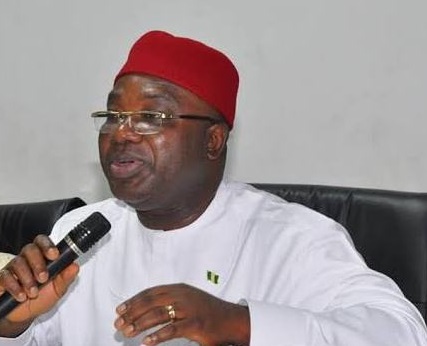How agrofinance promotes human rights (1)

“You are what you eat”
*anonymous.
Have you ever wondered how your kitchen or rather your pantry will look like if all the farmers should be on quarantine due to medical emergencies or are not producing up to optimal capacity? Surely, those most important sections of every households will be dry, empty, gloomy and ominous.

Have you as a Nigerian wondered why in peace time or when all things being equal that each visit you pay to a grocery your eyes are greeted by a variety of freshly harvested vegetables, fruits and other edibles that constitute the main engine of sustenance and survival as a living being?
Covid-19: FG is not sharing N100billion to Nigerians, Lai Mohammed warns
These basic questions are often glossed over or aren’t scientifically inquired into because due to the normal laissez faire tendencies of man, and given that there is an abundance of those fresh grocery at his beck and call, the man thinks almost very little about how these rich harvests of agricultural products come by.
However, an important fact of life is that qualitative agricultural productions are imperative for the realization of the larger goals of the achieving the constitutionally guaranteed Right to Life because if there are no nutrition then human life would be extinguished.
It follows therefore that making the production of agricultural products seamless is one sure way of mainstreaming the respect for the fundamental human rights provisions enshrined in the chapter 4 of the Constitution of the Federal Republic of Nigeria of 1999 (as amended).
From scholarly studies, we know that Human rights are the basic rights and freedoms that belong to every person in the world, from birth until death.
They apply regardless of where you are from, what you believe or how you choose to live your life.
They (Human Rights) can never be taken away, although they can sometimes be restricted – for example if a person breaks the law, or in the interests of national security.
These basic rights are based on shared values like dignity, fairness, equality, respect and independence.
These values are defined and protected by law.
In Britain our human rights are protected by the Human Rights Act 1998. To understand the question how human rights can help you, It is phenomenal to note that human rights are relevant to all of us, not just those who face repression or mistreatment.
Human Rights protect you in many areas of your day-to-day life, including: your right to have and express your own opinions; your right to an education ;your right to a private and family life; your right not to be mistreated or wrongly punished by the state
Also of significance is the truism that the idea that human beings should have a set of basic rights and freedoms has deep roots in Britain just as these landmark developments in Britain include:the Magna Carta of 1215;the Habeas Corpus Act of 1679;the Bill of Rights of 1689. One last thing before i continue with my conversatoons on human rights versus agrobusibess financing, is to state that the World is governed by a set of principles codified in many domestic legal instruments of all member states of the United Nations is The Universal Declaration of Human Rights.
A human rights focused British organisation had stated the fundamental orihin of the Universal Declaration of Human Rights and established a nexus with the atrocities of the Second World War which made the protection of human rights an international priority.
The grouo recalled that the United Nations was founded in 1945 just as the United Nations allowed more than 50 Member States to contribute to the Universal Declaration of Human Rights, adopted in 1948.
This the group said it was the first attempt to set out at a global level the fundamental rights and freedoms shared by all human beings.
The Universal Declaration of Human Rights formed the basis for the European Convention on Human Rights, adopted in 1950. It also formed the fulcrum of chapter 4 of the Constitution of the Federal Republic of Nigeria of 1999 as amended. Now that we have a working knowledge of human rights, we can as well proceed.
This is because for me i see agricultural activities and other affiliate programs as viral to sustainable development which for me is the reason for my clamour that the teaching of theory and practicals of agricultural science be made a compulsory course of study applicable to all high school of Secondary schools in Nigeria given that Nigeria is enormously endowed with a large population which is should give the Country a comparative advantage in agriculture than almost all other African nations.
It is indeed remarkable that successive federal administrations have at least made heavy weather about its relevance in the scheme of things with some of these federal administrations actually embarking on institutional buildings that are strategically targeted at enhancing agribusiness financing so as to unlock bank finance for agrobusiness.
I’m not sure most Nigerians know about the pragmatic approach the Central bank of Nigeria under the current governor of CBN Mr. Emefiele has made towards bridging the wide chasm between financial and credits granting institution and genuine farmers all across Nigeria through a baby it gave birth to institutionally that is known as NIRSAL- the Nigerian incentive based Risk sharing system for agricultural lending. Launched in 2011 and incorporated in 2013 by the Central bank of Nigeria as reportedly a dynamic, holistic $500 million Public-Private initiative to catalyse the flow of finance and investments into fixed agricultural value chains. It is an initiative of of the CBN; the bankers committee (BC) and the federal ministry of agriculture and Rural development. The Managing Director is Aliyu Abdulhameed who i was told by a colleague in the human rights sector is a multi-talented agricultural Economist with varied experience in institutional development, programme management and process development and improvement. Recently this institution had a business outing somewhere in Abuja and out of curiosity due to the complex nature of the meaning of its name NIRSAL, yours faithfully scent few minutes listening to his presentation on agricultural business financing and i must confess that I was thrilled beyond imagination and impressed that the current administration has this high calibre talented professional committed to the advancement of the agro allied industry of the Country that is the largest black nation in the globe. I heard him say that his institution has been able to pull out N100 billion from banks which were transparently deployed in the different genres of agrobusiness. That to me remains remarkable and impressive and i think this momentum needs to be sustained and upgraded if possible so Nigeria can achieve the famed self sufficiency in agricultural foods. At that event i learnt that the institution is right about now wooing deposit money banks to unlock bank finance for agrobusiness in Nigeria. Mark you, President Muhammadu Buhari has proved to be a political leader who does not trifle with the strategic place of agricultural business in the economic sector of Nigerian State. I had once accused President Muhammadu Buhari of unusual biasness towards the agricultural sector over and above other equally good sectors of the economy. But the knowledge I generated from that unplanned meeting I ran into by NIRSAL made indelible imprint on my philosophical mind.










